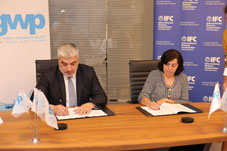
New IFC Partnership in Georgia to Help Save Water, Conserve Power
Friday, July 28
Tbilisi, Georgia, July 27, 2017—IFC, a member of the World Bank Group, has signed an agreement to help the Georgian Water and Power (gwp) company, a leading supplier of water in Georgia, conserve resources and become more energy efficient, improving its competitiveness and environmental performance.
With IFC’s advice, gwp will benchmark its energy consumption against global and regional peers, and identify opportunities to save water, lower energy costs, and increase efficiency. The partnership is the first advisory engagement of IFC’s Europe and Central Asia Energy and Water Solutions for Corporates advisory program in Georgia, part of a larger effort by IFC to combat climate change, safeguard the environment, and help companies improve their bottom lines.
“At GWP, we are always looking for ways to both protect the environment and become more efficient,” said Giorgi Tskhadadze, CEO of gwp. “With IFC’s support, we hope to identify measures to further increase the efficiency of our water supply operations, minimize energy consumption, and improve the quality of our services to customers, businesses and households.”
Georgia is aiming to reduce its energy use by 17 percent by 2030 while maintaining GDP growth at over 5 percent, which will require significant energy efficiency improvements across the economy. IFC’s new program promotes investment in energy and water efficiency, helping companies and municipalities across the region become more productive and competitive.
“IFC’s global experience working with more than 50 water utilities in over 20 countries demonstrates that using energy more efficiently is a win-win, both for business and the environment,” said Milagros Rivas Saiz, IFC Global Head of Advisory. “It can help reduce energy consumption by up to 30 percent and water losses by as much as 80 percent.”
Climate change remains a strategic priority for IFC. To date, IFC has invested $15.3 billion in long-term financing for renewable power, energy efficiency, climate smart agribusiness, green buildings, and smart cities, and mobilized $10.1 billion of capital from other investors into climate business.
Georgia became an IFC member in 1995. Since then, IFC has committed around $1.6 billion in long-term financing, of which $774 million was mobilized from partners. That financing has supported 59 projects in the financial services, agribusiness, manufacturing, and infrastructure sectors. In addition, IFC has supported more than $331 million in trade through its trade finance program, and implemented a number of advisory projects focused on developing the private sector in Georgia.
In fiscal year 2016, IFC invested almost $19 billion in developing countries worldwide.


